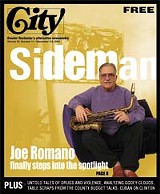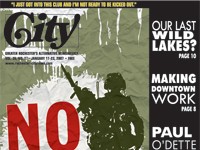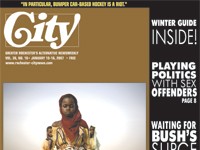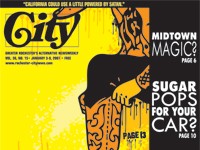[
{
"name": "500x250 Ad",
"insertPoint": "5",
"component": "15667920",
"parentWrapperClass": "",
"requiredCountToDisplay": "1"
}
]
You might think, by the age of 71, Joe Romano would have mellowed out a little. After six decades of playing, he might not be as aggressive or experimental on the saxophone.
Then something on his new album, This Is The Moment, leaps out at you. Toward the end of J.J. Johnson's "Lament," Romano is playing beautiful improvised melodies. And then the squeal.
But not just any squeal; this one fits perfectly musically and metaphorically, a sudden cry in a song about loss. But where did it come from on such a straight-ahead album?
"It seemed to fit in the vamp that I was playing. How I pulled it off --- don't ask," Romano says. "I heard Stan Getz do something like that on the Serenity album. It was just a dumb whim."
Actually, there was a bit more to the story.
"I had a bottle of Jack Daniels with me on that record date," he laughs. "I brought a little bottle for the guys in the band. I wound up drinking the whole thing. I go on a date, I walk in there, there's a stool here, a stool there, and a room where the rhythm section was. It was me and [trumpeter] Joe [Magnarelli] in a room with headsets. I can't record that way. I had a couple of nips. I think by that time I had been over-nipping and I was about ready to try anything. I didn't get a chance to hear the playback. When I heard it, I was as shocked as anybody else, but I pulled if off somehow."
Over the last half century, few Rochester jazz musicians have pulled off as much as Joe Romano.
Maybe you remember him from back in the early 1950s, sitting in with Sonny Stitt or Charlie Parker at a downtown jazz club. You might have heard him in the early 1960s when he played local clubs in a band with two young musicians, Chuck and Gap Mangione. I heard him for the first time in the mid-1970s at the Portside Bar on Irondequoit Bay, with Barry Keiner at the piano. But, for some local jazz aficionados, it was not until the 2002 or 2003 Rochester International Jazz Festival that they heard Romano on stage at the Montage Grille.
Romano has managed to carve out a niche on the local scene despite spending the bulk of his professional career on the west coast or traveling with some of the world's greatest big bands.
"I lived 25 to 30 years between Los Angeles and Las Vegas, but I'd come home once a year to see my mom and do a concert or a gig," he says.
You'll find Romano's muscular sax style on albums by Lionel Hampton, Woody Herman, Sam Noto, Chuck Israels & the National Jazz Ensemble, Buddy Rich, even Donna Summer. He's spent almost his entire professional career as a sideman, recording only one previous album as a leader. But good luck finding it; Finally Romano is only on vinyl and out of print.
Now he's released his first CD, backed by a top-notch ensemble consisting of Magnarelli, Dino Losito (piano), Neal Miner (bass), and Mike Melito (drums). Romano commands the nine tracks, ranging from standards like "My Old Flame" to wonderful originals by Minor, Losito, Magnarelli, and Romano himself.
Tunes like Magnarelli's "Epitaph for Sal Amico," Minor's "Contemplations," Losito's "Get On It," and Romano's own "Yesteryear" are executed in world-class bop arrangements that will take you right back to the 1950s. Soloing is excellent throughout.
"It was one of those magic dates," says Romano, "I walk in --- the bass player, I never even met this guy; Mike and Dino recommended him. But it sounds like we've been working together a year or so. It's a really tight sound. I put a lot of energy into it."
The session's younger players agree.
"He plays with a lot of guts," Melito says. "He's one of the last of the great bebop players." Melito and Magnarelli were instrumental in convincing Romano to record the album, which has gotten a great response on Rochester jazz radio. In fact, Romano himself is about the only one who criticizes his playing.
"It's starting to wane a little bit because the jobs are not around," he says. "You can't really keep up a strong physical thing on any instrument unless you work some. Practice doesn't do it for me. I've done all that. With me, I have to play."
Having played at just about every club in Rochester over the past 50 years, Romano is in a good position to judge the health of jazz here. Despite pockets of jazz musicians at the Eastman School of Music and elsewhere, and more jazz on the radio than in most cities, Romano is negative --- and outspoken --- about the scene.
"There's some jazz players out there, but the jazz scene is not like it was even 10 years ago," he says. "It's a struggle out there right now for a lot of guys. Not for me, I'm up in age and I had almost the tail end of the best of it. But the Montage is the only thing happening in town and now, with Tom Pethic being fired from WGMC, I'm very disappointed. He's been on the air 21 years. I don't know what happened. I don't understand it. The station's going to go down a notch as far as I'm concerned, because whoever else is on there doesn't know beans from bananas. He's the only one over there who really knew what was happening with jazz from its early roots. I'm not talking about guys who started playing 10 years ago. This guy goes back and plays all the stuff where all of us came from."
While Romano respects some of the newer players --- Nicholas Payton, Eric Alexander, Chris Potter --- he doesn't like most of the new music he hears. And don't get him started on pop music.
"Rap music, as far as I'm concerned there's no musical value there," Romano says. "To make those guys millionaires is a tragedy. Charlie Parker died broke."
Romano sees a decline in interest in jazz, even in strongholds like Europe. On a recent trip he spent a week in Amsterdam. Ten or 15 years ago, he says, there were eight thriving jazz clubs there. In 2003, he found only one.
He believes that non-smoking policies in bars are exacerbating the situation. In Europe, "they're still puffing like crazy in jazz clubs. In a club atmosphere, people want to smoke and drink."
One positive sign is the relative success of the Rochester International Jazz Festival. Romano has performed at both festivals, and admires the work promoter John Nugent is doing. He believes the Toronto ferry will help the festival grow.
But the kinds of jobs Romano had in the last several decades --- playing in the Thad Jones/Mel Lewis Band, backing Frank Sinatra and Jack Jones, playing on The Pearl Bailey Show and subbing on the Tonight Show with Johnny Carson --- have just about disappeared.
"It's an era that all of a sudden has gone poof. Where is it? What happened to it? Is there a history of music anymore?"
Romano believes strong teachers like Harold Danko and Bill Dobbins at the Eastman School are turning out a new generation of terrific players. But he wonders what the students will do with their skills.
"I feel sorry for the young people who spend all this money going to college and trying to go into this profession," he says. "There's no place to play. They spend thousands of dollars and when they come out they either become teachers or they quit."
He's even skeptical about whether most people who go out to hear jazz understand it. "Who wants to go in and sit down with four, five, six guys improvising. It's a very difficult thing, I would imagine, for the common ear to hear."
Romano's parents were second-generation Italian Americans. His mother (who played piano) worked in laundry, his father in a foundry. He began playing at the age of eight and was 10 years old when he played his first wedding and made his first $10 bill.
Growing up just off Lyell Avenue, Romano listened to Lester Young, Coleman Hawkins, Chu Barry, Ben Webster, Paul Gonsalves, Stan Getz, Jackie McLean, and Charlie Ventura.
"I used to sit in the house and play along with the radio," he says. "I liked the honking sort of playing, the really heavy tenor players. It took me a while to get into bebop and Charlie Parker. It finally struck my ear."
Top local players of the 1940s were also influential. Trombonist Hank Burger and saxophonists Johnny Lewis, Russ Mussieri, and Nate Agnello held jam sessions at the Triton club on Lake Ontario, next to where Abbots is today.
During his teen years, Romano took clarinet lessons at the Eastman School. He dropped out of Benjamin Franklin High School in 10th grade. "I just didn't have the head for it," he says. "My father told me to get a job or go in the service."
So, at 17, Romano went into the Air Force and that, he says, was his real education. He was in the Samson Base band and later, a band in Alaska. He played clarinet and sax, jazz and classical music.
While stationed at the Samson Base near Geneva, he was close enough to come home on weekends and sit in at Rochester clubs. And when Charlie Parker brought his band to a downtown club called Times Square in the early 1950s, Romano showed up with his sax and asked if he could sit in. He and two friends, a trumpeter and trombonist, played a set with Parker.
"I remember we played the head on 'Move' and maybe 'Perdido,'" Romano says.
He may have been playing with the world's greatest saxophonist, but Romano was accorded a solo by Parker, who stood to the side.
"He was very gracious," Romano says. "We played some fours and eights. Of course we stood there with our mouths agape because he was so good. He was really a marvelous saxophone player."
That was just the beginning. Romano sat in with Nat King Cole and Coleman Hawkins at the Band Box and Johnny Griffin, Eddie "Lockjaw" Davis, Sonny Stitt, and other legends at the Ridgecrest, the Pythodd, and other clubs.
Every Sunday, back in the 1950s and 1960s, there was a jam session somewhere. All you needed was an instrument and the nerve to step on the stage with the greats.
"We knew we weren't in that league yet, but we were trying," Romano says. "That was my education in jazz."
Later, when he joined Woody Herman's band, Romano had the opportunity to hear other giants like John Coltrane.
"We'd get to New York and play at a place called the Metropol for a week and he'd be at Birdland," he says. "After we were done, we'd go over there and listen to him play. I listened to Trane a lot. Trane came to Rochester a couple of times. I was fortunate to hear these people play in person: Trane, Miles, Bill Evans, Dizzy [Gillespie], Cannonball [Adderley]. The young people today didn't get a chance to hear them."
Sometimes the stars were homegrown.
In the late '50s, Romano was a frequent guest at the Mangione home on Martin Street, where he'd hang out and jam with Chuck and Gap. Eventually they put a band together and played at the Bandbox on State Street. One of Chuck Mangione's earliest albums, Recuerdo, provided Romano with his first recording date.
Although Mangione is regarded by some as a talented player who compromised his music in return for stardom, Romano sees it differently.
"He did his own thing," he says. "He still plays wonderful jazz. When he plays solos on his own records, basically what you hear is bebop. It's a different kind of format as far as the rhythm goes but he's done well with it. He always has good bands and he puts on a good show."
His relationship with the family continues; Romano's most recent recording session was a guest stint on Gap Mangione's new album.
Of all the legends he's met and played with, Sonny Rollins occupies a special place.
"He's a wonderful guy, no bullshit," Romano says. "He's a guy you can really get down with and talk to. He was kind of a philosopher about life and music, which has probably gotten him through a lot because he paid a lot of dues when he was younger, messing around with heroin. He was in bad shape. He got over all that, got very clean, started lifting weights, got himself in great shape."
In the endless 3 a.m. world of jazz, there's no shortage of casualties. Romano has managed to navigate his way through it relatively unscathed. "I was lucky," he says. "I saw a couple of friends in Woody's band go down like that and that woke me up."
Perhaps most upsetting to him was the death of Barry Keiner, a talented young pianist from Rochester who Romano thought the world of.
"I worked with Barry a lot; he was my man," he says. "I was instrumental in getting him in Buddy Rich's band. I mentioned him to Buddy. I was surprised when he joined the band because playing with big band is not actually the place for a piano player, but Buddy would feature him on trio things. Buddy really liked him. I was really upset. What a genius of that instrument. He could play at 17. What a great loss."
Though his frequent visits have made Romano feel like part of the Rochester scene, most of his career was spent on the west coast playing with band leaders like Bill Holman.
One of Romano's most memorable jobs in LA was his work on the film soundtrack of The Marrying Man. And his favorite part of the gig was listening to the session's soloist --- Stan Getz.
"We got to hear Stan play for two days in the studio," he says. "Stan was a wonderful guy. He had a kind of moody personality, he could also be stand-offish, but he was always very cool to me. He was a marvel to listen to."
To this day Romano is frustrated by the fact that, when the movie came out, the band was pushed way into the background. "For all the talent and effort we put in, you can hardly hear the band and you can hardly hear Stan Getz. It's ridiculous."
Of course that wasn't the only ridiculous thing Romano has encountered in his travels with the greats and not-so-greats.
When he was with Les Brown's Band of Renown in the mid-1970s, Romano had had about enough of Brown's mediocre playing.
"I said 'Do me a favor; stand at the other end of the saxophone section because you're playing so horribly out of tune.'" Brown's reaction? "He was cool with that."
Then there were the run-ins with the notorious taskmaster, Buddy Rich.
"We had our moments. I was the leader of the sax section, so I heard it from him," Romano says. "But it was worth it for the way the band sounded afterward. He whipped people into shape."
While gigs with Rich and Brown were fairly mainstream, Romano's experience was wide-ranging. That squeal that livens up "Lament" on his album wouldn't have been at all out of place in the early 1970s, when he was in a more avant-garde phase. Aside from playing some free-jazz gigs in LA, Romano sat in with Ornette Coleman. But, he adds, "I'm basically a harmonic, bebop player."
While on the west coast, he recorded a lot of sessions. He doesn't know if some of the sessions resulted in records.
With the good band gigs drying up, last year Romano and his wife, Judy, found themselves restless.
"We were in a funk out in Vegas," he says. "Judy had just finished teaching, I said let's get out. We bought a van. We were going to run around a bit. Then we found this dump and fixed it up."
Romano is referring to the now-beautiful small house the couple purchased in Irondequoit, about 100 feet from Lake Ontario. He says it's wonderful in the spring, summer, and fall, but you can get trapped there in the winter under endless lake-effect snow.
Still, it's home for a musician used to a nomadic lifestyle. There were times in the 1970s when Romano didn't even have a base; his home was wherever his bands traveled.
As for future plans, Romano can't make great music in a vacuum. He needs the stimulation of top-notch players and an active scene.
"When there's not a lot around, you start losing the desire to play," he says. "Negativity starts seeping through and you start playing games with your head."
He's shopping his CD to some music-industry contacts. If it takes off, who knows?
"If it's the only CD I do, I did a good one at least."
Looking back on a half-century in jazz, it wasn't a bad run.
"I didn't make a lot of money, but I made some money," Romano says. "And I got to play with some great people."
Latest in Featured story
More by Ron Netsky
-
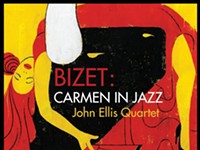
Album Review | 'Bizet: Carmen in Jazz'
Mar 26, 2024 -
'To Swing Is the Thing" by Mike Melito
Aug 10, 2023 - More »
